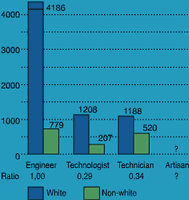

During the past several years, the SAIMC has not been directly involved in organising training courses and conferences.
The last major national conference organised by the SAIMC was in 1997 at the Electrex and Instrumentation Exhibition with another held in Durban in 2001. The SAIMC has preferred to sponsor such training workshops and conferences leaving it to the professional organisers such as IDC Technologies and the Institute for International Research.
There are also a number of smaller training organisations as well as equipment suppliers that offer many excellent courses. The SAIMC 'preference' to sponsor rather than organise is driven by the practicality of being a voluntary organisation and not having full time resources needed to organise such events. However, the SAIMC is well aware that its members and our industry in general expects more proactive involvement of the Institute, than merely adding its good name to such events. We also have an annual Education Grants Award of up to R30 000, but often find it difficult to disperse this sum, as there are very few submitted applications, which can only be attributed to a lack of awareness of this grant. The SAIMC is a founder member of the South African Council for Automation and Computation (SACAC) and also a member of the National Science and Technology Forum (NSTF) section of Scientific, Engineering and Technological societies and Allied Professions Group (SETAG). This membership developed from the old Associated Scientific and Technical Societies (AS&TS) via the short lived Federation of Scientific, Engineering and Technological (FEDSET) societies. It is this association recognition, which allows the SAIMC members who are registered with ECSA, to obtain their annual subscription at a greatly reduced rate.
Desired position
The SAIMC in partnership with tertiary institutions, industry and various national bodies such as the Engineering Council of South Africa (ECSA), the South African Qualifications Authority (SAQA) and the applicable Sector Education and Training Authorities (SETAs), would be accredited to run on a scheduled programme, short training courses of up to five days on various measurement and control topics of general interest. This would include basic theory, reference to associated national and international standards and practices, design applications and a practical hands-on workshop. In addition to these short courses, it is felt that an instrumentation 'refresher class' should be available which would run for a month to give students leaving tertiary institutions or persons associated with process instrumentation, an intensive refresher course on specific measurement and control principles including practical workshop experience. This would cover a spectrum of applications from analysers to zener barriers. A few trips to operating facilities could also be arranged during this period. It is believed that this would be invaluable to the students and potential employers prior to joining their respective companies. These courses would be tutored by experienced persons from industry, who know the operating principles and have had the practical experience. Adequate technical literature with reference manuals would be issued covering all course instruction material. The SAIMC could as an independent body, also evaluate technician competency for companies in the form of an examination prior to employment or during employment to assess the employee's professional development. The SAIMC is at present in discussions with the Instrumentation, Systems and Automation (ISA) society, for use of a number of their training courses including their excellent standards, books and visual material. Visit their excellent website ( www.isa.org).
To initiate the activities as indicated above would require a business plan to be established with good financial sponsorship from industry (including both end users and equipment suppliers) and grants from the respective government national training bodies. There are however a few organisations that are already performing similar work to these suggested activities, and it may be a more beneficial and cost effective approach for the SAIMC to 'actively' work with such an organisation in achieving our desired position. The SAIMC would welcome any additional suggestions on this subject and dialogue with potential partners.
Demographics in our engineering sector
One is often asked 'What is the ideal ratio between the four categories of skilled workers?' ie, the engineer, technologist, technician and artisan. The writer believes that the make-up ratio shown in Figure 1 satisfies the need of most developed countries.

One will notice the increasing work responsibility overlap for each group from artisan to engineer. If we compare the three groups that have registered with ECSA as professionals, since our first democratic elections in 1994, ie, over the last decade, we have the situation shown in Figure 2.

It is recognised that professional registration with ECSA does not reflect the actual engineering demographics in the workplace, although it must be said that it is difficult for a true professional to put up a significant argument as to why he or she should not be registered. It was unfortunate that the SARS deemed fit to remove the ECSA registration and institute membership fees as a tax deductible item, however, many companies will now pay the employee's annual registration fees as it is seen as adding professional value to the company. If one compares the 'ideal' working group ratios as indicated with those above and allowing for actual workplace conditions, it confirms what has been known for some time, that our nation is not producing the numbers of engineering technologists and technicians that are required to sustain our economic development. If we had an accurate measure of our qualified artisans that are so important to our industry, it is sure to reflect similar shortcomings. It should, however, be mentioned, that over the past few years there has been a decline in the ECSA Engineer registration with an increased trend in technologist/technician registration. We also need to get our young highschool pupils more interested in engineering, but this requires a good grade in science and mathematics, subjects that do not seem to be so 'cool' with youngsters today.
It is also quite clear to see from the political demographics, why engineering companies on the technical side cannot meet the requirements of the Employment Equity Act (Act No. 55 of 1998). However, this is slowly being achieved on the non-technical side of most companies. The Black Economic Empowerment (BEE) partners are also slowly being incorporated within the established business community either directly or in an outsourcing capacity. Again, in the non-technical area, it is a question of training and maintaining minimum competency levels including business ethics, a problem we seem to have within some of our government related bodies and municipal administrations. This is not said with malice, for the majority of our population to have been denied the stability of family life with home ownership, good education and equal work opportunities for so long, one cannot expect this indignation to be rectified in one decade. This is being addressed and with great enthusiasm, but it will take much longer than what many of us are led to believe by certain statements. It was this past situation, led mainly by the Congress of South African Trade Unions (COSATU), which initiated the South African Qualifications Authority Act (Act No. 58 0f 1995). This was followed by the Skills Development Act (Act No. 97 of 1998), which created the Sector Education and Training Authorities that are in turn financed by the Skills Development Levies Act (Act No. 9 of 1999). This transformation, which was much needed, has had a negative effect on part of our technical community, both young and not so young, who see job opportunities and promotions blocked due to the affirmative action programme. Many such qualified persons have left South Africa, some of which may also be partly due to our unacceptably high crime rate, but hopefully one-day they will return to our wonderful country.
Professional development and training
This is the path forward in attaining national economic prosperity, a competitive advantage for operating companies and freedom of employment opportunity including associated financial rewards for the individual. South African industry is, however, not 'investing' enough in employee training and learnerships; although much of this cost can now be claimed back against the skills levy payment structure. Professional development and training or life-long learning, requires of the individual a sound secondary and where possible tertiary education. This is required to achieve one of the eight certified education levels within the National Qualifications Framework (NQF). Most measurement and control practitioners will slot into the National Standards Body (NSB) group 06 (not to be confused with the NQF level 6) which covers manufacturing, engineering and technology, there are 12 such groups or fields, each having their associated Standards Generating Body (SGB). The NQF sets guidelines and principles by which records of learner achievement are registered to enable national recognition of the individuals acquired skills and knowledge throughout his or her career, thus satisfying the NQF's commitment to the outcomes-based education and training principle. The Education and Training Quality Assurance (ETQA) bodies evaluate the learning programmes of the different sector-training providers in a process of accreditation, thereby assuring that the learners have achieved the outcome competency required for that particular standard or qualification. Yes, there are many such associated bodies and not all of them have been mentioned here, some would say that there are too many, leading to an unmanageable bureaucratic malaise, but it seems to be working. On the ECSA website ( www.ecsa.co.za) there is a section dedicated to the associated acronyms of these various national bodies.
There are three prime requisites in achieving the set goals in one's career. The first is to have the personal commitment and desire of wanting to succeed, this is not as easy as it seems and there will be many disappointments along the way, but it develops one's character. The second requisite is to have a documented roadmap with realistic timeframes of the technical and non-technical activity outcomes needed to attain your goal. This is to a certain extent what the NQF attempts to put in place, but the individual must manage and drive this process. This is often a bumpy road with many potholes and several bridges to cross in reaching one's final destination; it is the work experience together with your mistakes that makes this journey so valuable. The third requisite which is so important in one's early career, is to have a mentor, one who can give you good friendly advice and guide you technically in your career development and also to help dig you out of some of those potholes. It is unlikely that one will retain the same mentor, you will change jobs and after all, as you get older so your mentors will get older and there will come a time when hopefully you will also become a mentor.
Although the SAIMC has not produced a Career Management roadmap at present, there is such a document on the UK Institute of Measurement and Control website ( www.instmc.org.uk) under Your Career.
R.J. (Dick) Perry, SAIMC general secretary, chairman Education and Training Sub-Committee, [email protected]
© Technews Publishing (Pty) Ltd | All Rights Reserved